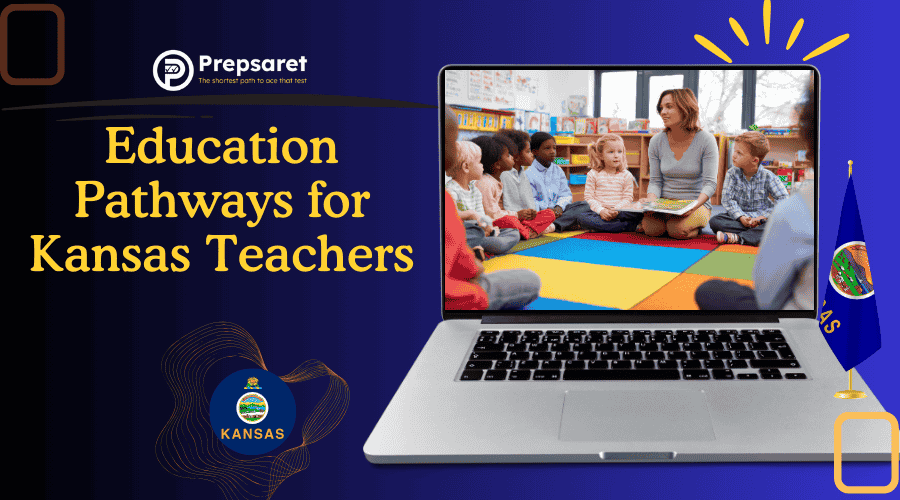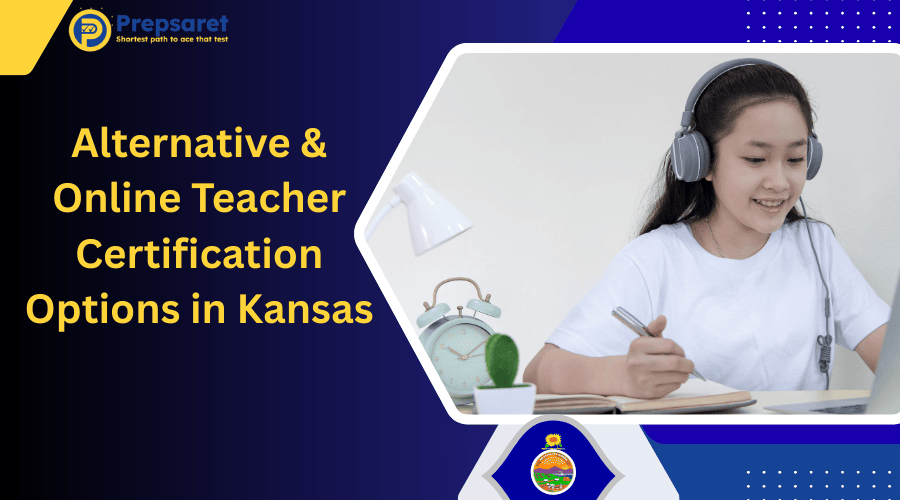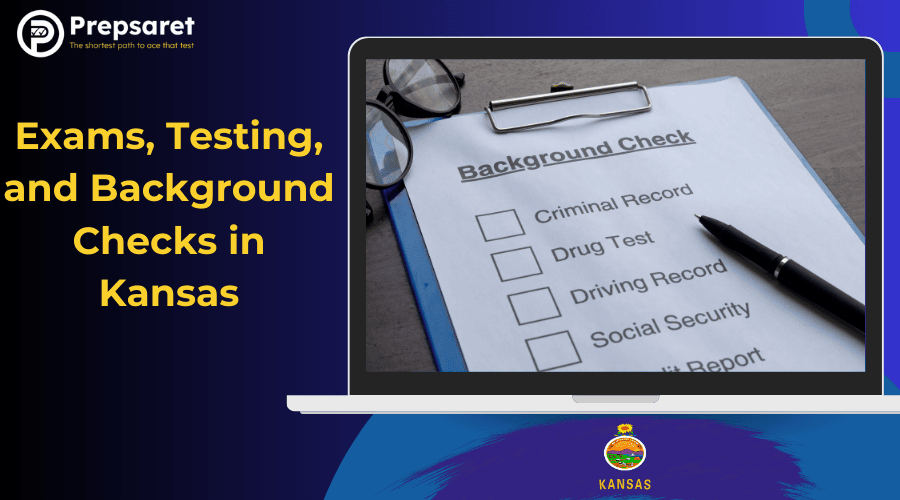Kansas faces a growing demand for qualified educators across all grade levels, making teaching an increasingly attractive career choice. How to become a teacher in Kansas involves understanding specific state requirements, education pathways, and certification processes.
With excellent career opportunities and competitive salaries, teaching degrees in Kansas provide a solid foundation for educational professionals. Prepsaret offers comprehensive preparation materials to help aspiring teachers excel on required exams and achieve their certification goals efficiently.
Education Pathways for Kansas Teachers
Understanding the educational foundation required for teaching in Kansas is crucial for aspiring educators. The state maintains specific standards to ensure all teachers meet professional competency requirements.
What Degree Do You Need to Become a Teacher in Kansas
The required degree to teach in Kansas depends on your intended teaching level and subject area.
All prospective teachers must complete a bachelor’s degree from an accredited institution. The degree should align with your chosen teaching field, whether it’s elementary education, secondary subject areas, or specialized fields.
Kansas Teacher Education Program Requirements
Kansas teacher education requirements include:
- Completion of a state-approved teacher preparation program
- Minimum GPA requirements (typically 2.75 or higher)
- General education coursework covering core academic areas
- Subject-specific content knowledge courses
Academic Content Standards for Kansas Teachers
When selecting teaching degrees in Kansas, programs must demonstrate mastery of content knowledge appropriate to the grade level and subject area you plan to teach.
Elementary teachers need broad knowledge across multiple subjects, while secondary teachers focus on specific content areas like mathematics, science, English, or social studies.
The Kansas teacher credentialing process requires candidates to show proficiency in:
- Pedagogical knowledge and teaching methods
- Child development and learning theory
- Classroom management techniques
- Assessment and evaluation strategies
- Technology integration in education
Kansas Teacher Preparation Programs Overview
The state offers multiple pathways through approved preparation programs designed to develop effective educators.
Traditional University Programs in Kansas
Kansas teacher preparation program options include traditional four-year university programs that combine academic coursework with practical teaching experience. These programs provide comprehensive training in both content knowledge and pedagogical skills.
Teaching programs in Kansas typically include:
- Education theory and methodology courses
- Student teaching or clinical experiences
- Specialized courses for your teaching area
- Field experiences in diverse educational settings
Key Components of Kansas Teacher Preparation Programs
Kansas teacher preparation programs incorporate several key elements to ensure teacher readiness. Students complete coursework in curriculum development, instructional strategies, and educational psychology while gaining hands-on experience through field placements.
Kansas Teacher Licensure Preparation Requirements
The Kansas teacher licensure process requires successful completion of an approved preparation program, which includes:
- Minimum credit hours in professional education
- Content area specialization requirements
- Supervised teaching experience
- Portfolio development and assessment
How Long Does It Take to Become a Teacher in Kansas?
The timeline to become a licensed teacher in Kansas depends on the pathway you choose. A traditional bachelor’s degree and teacher preparation program usually takes about four years to complete.
For those entering through alternative teacher certification Kansas routes, the process can be shorter, often 1 to 2 years, since candidates may already hold a degree in another field.
Overall, how long it takes to become a teacher in Kansas varies based on prior education, program structure, and testing requirements, but most candidates can expect the journey to last between 2 and 5 years.
Find Out: How Long Does it Take to Get your Praxis Scores Back
Alternative & Online Teacher Certification Options in Kansas
Kansas recognizes that many qualified professionals pursue teaching careers later in life, so the state provides flexible pathways for career changers.
Alternative Teacher Certification Routes in Kansas
Alternative teacher certification Kansas programs provide opportunities for individuals with bachelor’s degrees in other fields to transition into teaching. These programs are designed for working professionals who need flexible scheduling options.
Requirements for Kansas Alternative Teacher Certification
Kansas alternative teacher certification requirements include:
- Bachelor’s degree from an accredited institution
- Demonstration of content knowledge in teaching area
- Completion of alternative preparation program
- Passing required assessments and background checks
Restricted Teaching License Options in Kansas
A restricted teaching License Kansas allows qualified individuals to teach while completing certification requirements. This option is particularly valuable for districts facing teacher shortages in specific subject areas.
Requirements for restricted licensing include:
- Bachelor’s degree with content knowledge in teaching field
- Enrollment in approved alternative certification program
- Employment commitment from Kansas school district
- Mentorship and supervision arrangements
How to Become a Teacher in Kansas Online
In today’s modern landscape, becoming a teacher in Kansas online has become increasingly accessible. Many universities and approved providers offer online teacher preparation programs that meet state requirements while providing scheduling flexibility for busy professionals.
How to Become a Teacher in Kansas Without a Degree in Education
How to become a teacher in Kansas without a traditional four-year education degree is possible through alternative certification programs that combine online coursework with practical teaching experience.
Kansas State Department of Education (KSDE) Licensing Process
The official licensing process through KSDE ensures all teachers meet state standards and requirements.
Application Procedures for Kansas Teacher Certification
The Kansas Teaching License Application is submitted entirely online through the official KSDE portal. Applicants must pay close attention to documentation and deadlines to avoid delays.
Obtaining Kansas teacher certification involves several steps, including:
- Online application submission through KSDE portal
- Official transcripts from all colleges attended
- Verification of program completion
- Background check and fingerprinting
- Payment of required fees
Kansas Teaching License Types and Endorsements
Kansas teaching license requirements vary based on the type of license and endorsement areas. The state offers initial, standard, and advanced licenses with different validity periods and renewal requirements.
The Kansas teacher application process includes selecting appropriate endorsement areas that align with your preparation and intended teaching assignments.
Common endorsement areas include elementary education, secondary subject areas, and specialized fields like special education or English as a Second Language.
Steps to Become a Certified Teacher in Kansas
To become a certified teacher in Kansas candidates follow a logical progression:
- Step 1: Complete approved teacher preparation program
- Step 2: Pass required Praxis examinations
- Step 3: Submit application through KSDE licensure portal
- Step 4: Complete background check and fingerprinting
- Step 5: Receive initial teaching license
- Step 6: Begin teaching under mentorship guidance
Kansas Teaching License Lookup Tool
Kansas teaching license lookup services allow employers, parents, and other interested parties to verify teacher credentials and license status. This public database ensures transparency and accountability in the education system.
Exams, Testing, and Background Checks in Kansas
Kansas requires specific assessments and screenings to ensure teacher competency, classroom readiness, and student safety across all grade levels.
Kansas Praxis Testing Requirements
Kansas Praxis test requirements include multiple assessments depending on your teaching level and subject area. The Praxis Core tests assess basic academic skills, while Praxis Subject Assessments measure content knowledge in specific teaching fields.
Required Praxis tests typically include:
- Praxis Core Academic Skills: Reading (5713)
- Praxis Core Academic Skills: Writing (5723)
- Praxis Core Academic Skills: Mathematics (5733)
- Praxis Subject Assessments for teaching area
- Praxis Principles of Learning and Teaching (PLT)
Kansas Teacher Exam and Background Check Process
The Kansas teacher exam and background check process ensures all educators meet professional and personal standards. Background checks include criminal history, child abuse registry searches, and reference verification.
How to Prepare for Praxis Exam in Kansas
Preparing effectively is critical for success. Prepsaret provides comprehensive Praxis preparation materials with practice tests, study guides, and exam strategies to help candidates achieve passing scores on their first attempt.
Out-of-State Applicants and Reciprocity in Kansas
Teachers from other states can often transfer their credentials to Kansas through reciprocity agreements designed to streamline the licensing process.
Kansas Teacher Reciprocity Requirements
Kansas teacher reciprocity allows qualified teachers from other states to obtain Kansas licensure without completing full preparation programs. Reciprocity requirements typically include valid teaching license from another state, completion of approved preparation program, and meeting Kansas-specific requirements.
How to Get a Kansas Teaching License with Out-of-State Degree
Understanding how to get a Kansas teaching license with out-of-state degree is important for applicants relocating to Kansas.
Teachers with degrees from accredited institutions in other states may qualify for Kansas licensure through reciprocity agreements, often with only minimal additional coursework or testing required..
Teaching Requirements by Grade Level in Kansas
Different grade levels have specific preparation and licensing requirements to ensure educators are fully prepared for the developmental and academic needs of their students.
Elementary Education Requirements in Kansas
Teaching requirements for elementary teachers in Kansas include broad preparation across multiple subject areas including reading, mathematics, science, and social studies.
Elementary teachers must demonstrate competency in child development and age-appropriate instructional strategies.
Secondary Education Requirements in Kansas
Kansas high school teacher requirements focus on deep content knowledge in specific subject areas. Secondary teachers typically need subject-area degrees and demonstrated expertise in their teaching fields, along with pedagogical training for adolescent learners.
Kansas Teacher Career Outlook & Salaries
Understanding the job market and compensation landscape is essential when planning a teaching career in Kansas.
Kansas Teacher Salary
Teacher salary in Kansas vary by district, level of experience, and education. Starting salaries typically range from $35,000 to $42,000 annually, with experienced educators earning significantly higher pay.
Urban and suburban districts, especially those with stronger tax bases, generally offer more competitive compensation and comprehensive benefit packages. Advanced degrees and additional endorsements can also increase earning potential over time.
Employment Opportunities for Kansas Teachers
Kansas teaching jobs are available across the state, with particular demand in:
- Mathematics,
- Science,
- Special education, and
- English as a Second Language (ESL)
Rural districts often offer signing bonuses and loan forgiveness programs to attract qualified teachers.
Job Market Factors Affecting Kansas Teachers
Several factors contribute to steady opportunities in Kansas education, including:
- Growing student enrollment in many districts
- Retirement of experienced teachers creating new openings
- Increased state and local funding for education programs
- Technology integration driving demand for innovative teaching roles
Comparing Teacher Certification in Kansas and Missouri
Regional differences in teacher certification, salaries, and job markets can influence career planning and relocation choices.
Missouri Teacher Certification and Reciprocity With Kansas
How to become a teacher in Missouri follows a process similar to Kansas, though there are notable differences in testing requirements and reciprocity policies.
Kansas and Missouri share reciprocity agreements, which make it easier for licensed teachers to transfer credentials across state lines.
Continue Reading: How Praxis Scoring Works
How to Become a Teacher in Kansas: FAQs
Traditional programs require four years for bachelor's degree completion, while alternative certification can take 1-2 years depending on your background and program structure. Requirements include a bachelor's degree, completion of approved preparation program, passing Praxis exams, background checks, and Kansas teacher certification application. Alternative teacher certification Kansas programs offer the fastest route, typically taking 12-24 months for qualified candidates with bachelor's degrees. Substitute teacher pay ranges from $80-150 per day, varying by district and qualifications. No, Kansas requires a bachelor's degree for all teaching positions. However, associate degree holders can work as paraprofessionals while pursuing their bachelor's degree. How Long Does it Take to Be a Teacher in Kansas?
What Is Required to Become a Teacher in Kansas?
What Is the Quickest Program to Become a Teacher?
How Much Do Substitute Teachers Get Paid in Kansas?
Can You Teach With an Associate's Degree in Kansas?
How to Become a Teacher in Kansas: Conclusion
Becoming a certified teacher in Kansas requires dedication to meeting state requirements, completing approved preparation programs, and passing required assessments.
The process involves understanding Kansas teacher certification requirements, choosing appropriate education pathways, and successfully navigating the licensing process.
How to become a teacher in Kansas demands commitment but offers rewarding career opportunities with competitive salaries and job security.
Trust Prepsaret for comprehensive exam preparation materials and practice tests to ensure your success on required certification exams. Start your teaching journey today!




